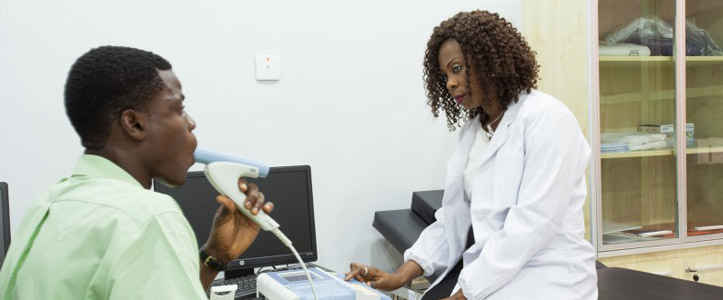Ebola is a severe acute and highly contagious viral disease capable of spreading rapidly through the world. Ebola is a viral illness of which the initial symptoms can include a sudden fever, intense weakness, muscle pain and a sore throat while subsequent stages are vomiting, diarrhea and – in some cases – both internal and external bleeding (World Health Organization 2014). The current outbreak is the deadliest since Ebola was discovered in 1976. The disease infects humans through close contact with infected animals, including chimpanzees, fruit bats and forest antelope. It then spreads between humans by direct contact with infected blood, bodily fluids or organs, or indirectly through contact with contaminated environments. Even funerals of Ebola victims can be a risk, if mourners have direct contact with the body of the deceased. Healthcare workers are at risk if they treat patients without taking the right precautions to avoid infection. People are infectious as long as their blood and secretions contain the virus – in some cases, up to seven weeks after they recover. If this virus is able to replicate in humans, and be efficiently transmitted from one human to another, a pandemic already exist, with the potential to cause widespread morbidity and mortality across the globe. The Ebola outbreak in West Africa is the world’s deadliest to date and the World Health Organization has declared an international health emergency as more than 2,100 people have died of the virus in Guinea, Liberia, Sierra Leone and Nigeria this year.
The current Ebola outbreak has become a public health threat due to its associated morbidity and mortality. Among those at high risk for being infected with EVD, healthcare workers have been identified as the priority group whose preparedness is a critical element in the response to the pandemic. In addition to patient care, health care workers (HCWs) are involved in public health education, epidemiological surveillance, quarantine management, primary care clinics and more. Although the role of HCWs is important during Ebola emergencies, not all healthcare workers are ready or prepared to work with infectious patients that will expose them to death.
Willingness of healthcare workers to risk their lives
The willingness of healthcare workers to risk their lives for a patient with a potentially fatal, communicable disease is a major concern, especially during a pandemic where the need for adequate staffing is crucial and where the public atmosphere might enhance anxiety and fear of exposure. Health-care workers have frequently been infected while treating patients with suspected or confirmed Ebola Virus Disease (EVD). This has occurred through close contact with patients when infection control precautions are not strictly practiced. A man who flew from Liberia to Lagos in July was quarantined on his arrival and later died of Ebola – the first case in Nigeria. One of the nurses who treated him and an official who came into direct contact with him has since died. In West Africa, high proportion of doctors, nurses, and other health care workers who have been infected by the deadly disease. The current outbreak is of worrisome pandemic potential as the virus is already affecting capital cities as well as remote rural areas are affected, vastly increasing opportunities for undiagnosed cases to have contact with hospital staff. To date, more than 240 health care workers – including prominent doctors in Sierra Leone and Liberia – have developed the disease in Guinea, Liberia, Nigeria, and Sierra Leone, and more than 120 have died thereby depriving these countries of experienced and dedicated medical care.

